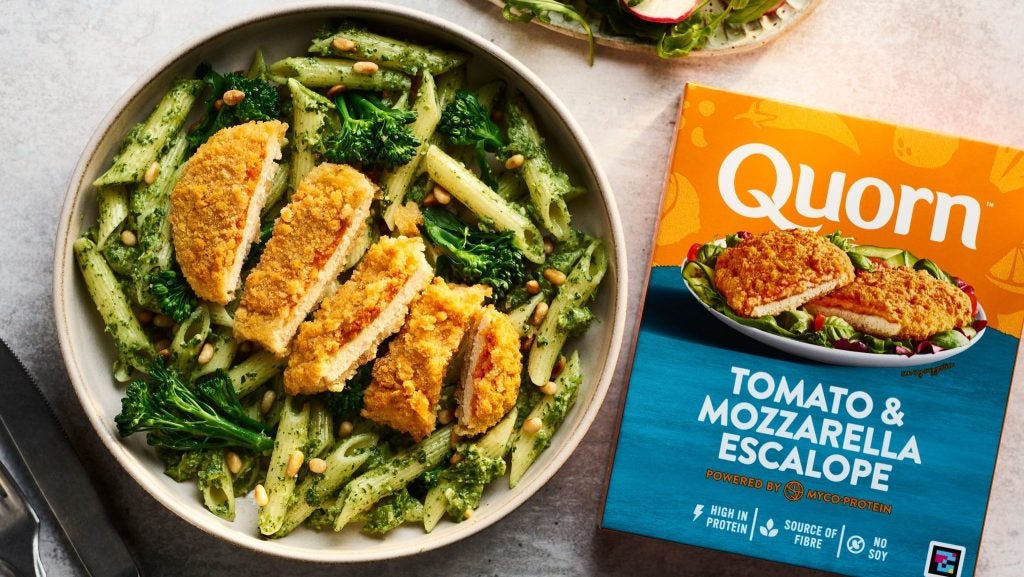Monde Nissin’s 2023 fiscal year was marred by another impairment charge for its meat-alternatives business as sales fell and losses widened.
The start of the new financial year does not look much better as the Quorn meat-free brand owner said sales in the first quarter are likely to be down high single-digits, along with another “breakeven” rate for EBITDA.
Henry Soesanto, the CEO of Philippines-based Monde Nissin, said the category continues to “face headwinds”, although sales in the broader Asia Pacific branded food and beverage business (APAC BFB) posted “record revenues”.
An impairment of 10.1bn pesos ($178.2m) was booked in the 12 months to 31 December, adding to the 20.5bn pesos in the previous fiscal year.
However, backing from Monde Nissin’s controlling shareholders via the family holding company MNSG Holdings in Singapore, which was pledged last year following the initial impairment, helped offset the 2023 charge. Group CFO Jesse Teo said that amounted to 1.3bn pesos in the year just passed.
“The environment remains challenging,” Soesanto told analysts yesterday (11 April) in a discussion of the results.
“We were required to take another impairment in the business. While the impairment was significant, the listed company was substantially insulated from the impact due to the financial support.”
While group revenue for both the APAC BFB and meat-alternatives businesses rose 9.2% for the year to 80.2bn pesos, the latter saw sales decline 4.3% to 14.3bn pesos.
Fourth-quarter meat-free sales dropped 4.2% to 3.9bn pesos but the drop was more protracted in organic terms at 6.3%, with volumes down 9.8%.
“We believe a continued focus on cost reduction and improving efficiencies, aided by better trends in input costs, will reduce the risks of further substantial impairments,” Soesanto said in the results commentary.
“The APAC BFB business saw strong top-line growth and profitability, driving record revenues and translating into strong operating cash flows.”
Despite the pressure on Quorn’s retail sales, Soesanto said foodservice “continues to perform well”, with revenue up 6% for the year.
Nick Cooper, the CFO of the Quorn division, added sales to the out-of-home channel were “driven by strong performance in the UK and Europe, including growth in KFC, partially offset by lower sales in the US and then some other QSR customers”.
However, Cooper suggested there had been some reassessment in meat alternatives following a “valuation exercise”.
He added: “We've worked very hard through that exercise to come to a realistic valuation that's neither pessimistic nor optimistic. One that's grounded in the challenging reality that we find ourselves in today.
“And that valuation does have a more modest growth rate than has been used in valuations previously. But the valuation and the projection do assume that the market stabilises and returns to growth.”
Cooper also suggested much of the pressure on sales is coming from the UK amid inflation and interest-rate increases.
“It's fair to say that conditions in the UK, while they have improved, remain challenging. In the latest quarter, inflation continued to fall but remained significantly above the historic baseline with food inflation running at 8%.”
Quorn lost market share in the UK chilled category but gained in the frozen case, Cooper said, adding that there is “growing competitive pressure in the tofu segment”.
Marco Bertacca, who heads up Quorn as CEO, gave some further perspective, noting sales in Europe “have been growing” but are still declining elsewhere.
“It is clear that unfortunately both the UK and the US market, and in general the global market for meat alternatives, is still very tough.
“The key driver for this is still the cost-of-living crisis and the element of consumer confidence and the fact that in the circumstances consumers are preferring cheaper ways of nutrition.”
Quorn, however, continues to hold a “leadership position” in the UK meat-alternatives market, according to Monde Nissin.
Market share was put at 32.1% for the fourth quarter, flat with 32.4% in the prior three months and 32.2% in the final quarter of 2022.
“Our position in the market remains strong and in particular our position with customers who are still strong believers, in particular the UK and Europe, of this category,” Bertacca said.
“Our space on the shelf remains intact or in some circumstances becomes even bigger.”
Monde Nissin classed the 4m peso, 2023 full-year EBITDA loss as “breakeven”, compared to a 618m pesos profit a year earlier. But losses on the bottom line ballooned to 966m pesos, wider than the 272m peso net loss in the prior 12 months.
“The category continues to face headwinds. We are keeping a close eye on costs, which has enabled us to get breakeven on EBITDA this year,” Soesanto said.









